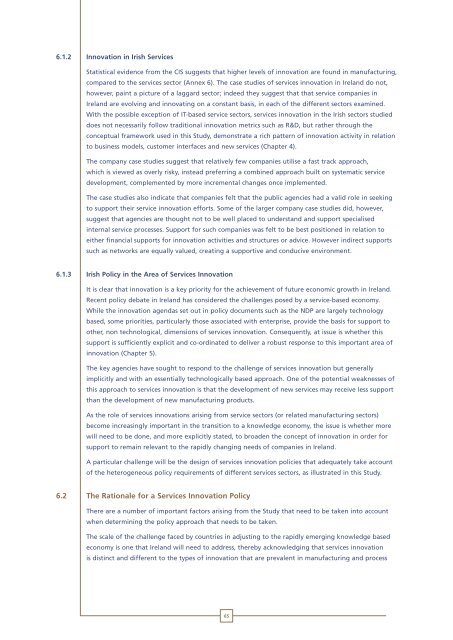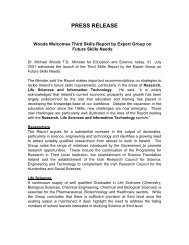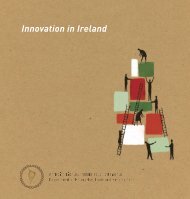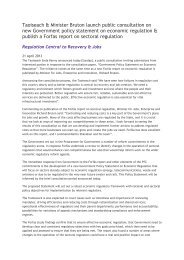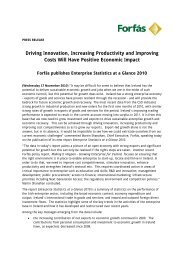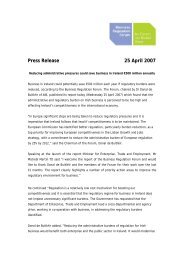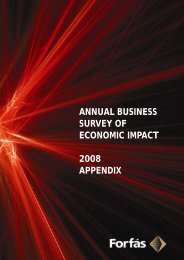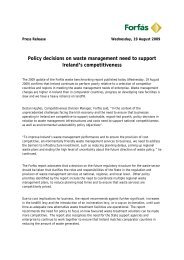Services Innovation in Ireland - Options for ... - Europe INNOVA
Services Innovation in Ireland - Options for ... - Europe INNOVA
Services Innovation in Ireland - Options for ... - Europe INNOVA
You also want an ePaper? Increase the reach of your titles
YUMPU automatically turns print PDFs into web optimized ePapers that Google loves.
6.1.2 <strong>Innovation</strong> <strong>in</strong> Irish <strong>Services</strong><br />
Statistical evidence from the CIS suggests that higher levels of <strong>in</strong>novation are found <strong>in</strong> manufactur<strong>in</strong>g,<br />
compared to the services sector (Annex 6). The case studies of services <strong>in</strong>novation <strong>in</strong> <strong>Ireland</strong> do not,<br />
however, pa<strong>in</strong>t a picture of a laggard sector; <strong>in</strong>deed they suggest that that service companies <strong>in</strong><br />
<strong>Ireland</strong> are evolv<strong>in</strong>g and <strong>in</strong>novat<strong>in</strong>g on a constant basis, <strong>in</strong> each of the different sectors exam<strong>in</strong>ed.<br />
With the possible exception of IT-based service sectors, services <strong>in</strong>novation <strong>in</strong> the Irish sectors studied<br />
does not necessarily follow traditional <strong>in</strong>novation metrics such as R&D, but rather through the<br />
conceptual framework used <strong>in</strong> this Study, demonstrate a rich pattern of <strong>in</strong>novation activity <strong>in</strong> relation<br />
to bus<strong>in</strong>ess models, customer <strong>in</strong>terfaces and new services (Chapter 4).<br />
The company case studies suggest that relatively few companies utilise a fast track approach,<br />
which is viewed as overly risky, <strong>in</strong>stead preferr<strong>in</strong>g a comb<strong>in</strong>ed approach built on systematic service<br />
development, complemented by more <strong>in</strong>cremental changes once implemented.<br />
The case studies also <strong>in</strong>dicate that companies felt that the public agencies had a valid role <strong>in</strong> seek<strong>in</strong>g<br />
to support their service <strong>in</strong>novation ef<strong>for</strong>ts. Some of the larger company case studies did, however,<br />
suggest that agencies are thought not to be well placed to understand and support specialised<br />
<strong>in</strong>ternal service processes. Support <strong>for</strong> such companies was felt to be best positioned <strong>in</strong> relation to<br />
either f<strong>in</strong>ancial supports <strong>for</strong> <strong>in</strong>novation activities and structures or advice. However <strong>in</strong>direct supports<br />
such as networks are equally valued, creat<strong>in</strong>g a supportive and conducive environment.<br />
6.1.3 Irish Policy <strong>in</strong> the Area of <strong>Services</strong> <strong>Innovation</strong><br />
It is clear that <strong>in</strong>novation is a key priority <strong>for</strong> the achievement of future economic growth <strong>in</strong> <strong>Ireland</strong>.<br />
Recent policy debate <strong>in</strong> <strong>Ireland</strong> has considered the challenges posed by a service-based economy.<br />
While the <strong>in</strong>novation agendas set out <strong>in</strong> policy documents such as the NDP are largely technology<br />
based, some priorities, particularly those associated with enterprise, provide the basis <strong>for</strong> support to<br />
other, non technological, dimensions of services <strong>in</strong>novation. Consequently, at issue is whether this<br />
support is sufficiently explicit and co-ord<strong>in</strong>ated to deliver a robust response to this important area of<br />
<strong>in</strong>novation (Chapter 5).<br />
The key agencies have sought to respond to the challenge of services <strong>in</strong>novation but generally<br />
implicitly and with an essentially technologically based approach. One of the potential weaknesses of<br />
this approach to services <strong>in</strong>novation is that the development of new services may receive less support<br />
than the development of new manufactur<strong>in</strong>g products.<br />
As the role of services <strong>in</strong>novations aris<strong>in</strong>g from service sectors (or related manufactur<strong>in</strong>g sectors)<br />
become <strong>in</strong>creas<strong>in</strong>gly important <strong>in</strong> the transition to a knowledge economy, the issue is whether more<br />
will need to be done, and more explicitly stated, to broaden the concept of <strong>in</strong>novation <strong>in</strong> order <strong>for</strong><br />
support to rema<strong>in</strong> relevant to the rapidly chang<strong>in</strong>g needs of companies <strong>in</strong> <strong>Ireland</strong>.<br />
A particular challenge will be the design of services <strong>in</strong>novation policies that adequately take account<br />
of the heterogeneous policy requirements of different services sectors, as illustrated <strong>in</strong> this Study.<br />
6.2 The Rationale <strong>for</strong> a <strong>Services</strong> <strong>Innovation</strong> Policy<br />
There are a number of important factors aris<strong>in</strong>g from the Study that need to be taken <strong>in</strong>to account<br />
when determ<strong>in</strong><strong>in</strong>g the policy approach that needs to be taken.<br />
The scale of the challenge faced by countries <strong>in</strong> adjust<strong>in</strong>g to the rapidly emerg<strong>in</strong>g knowledge based<br />
economy is one that <strong>Ireland</strong> will need to address, thereby acknowledg<strong>in</strong>g that services <strong>in</strong>novation<br />
is dist<strong>in</strong>ct and different to the types of <strong>in</strong>novation that are prevalent <strong>in</strong> manufactur<strong>in</strong>g and process<br />
65


